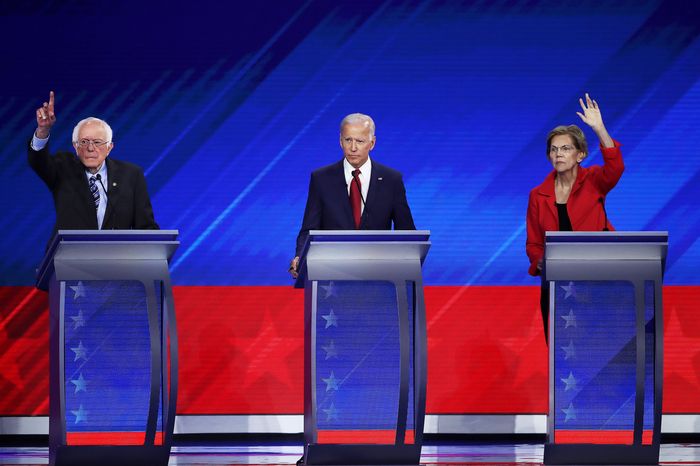
Bernie Sanders is in a virtual tie for first place in Iowa and California, leads the pack in Nevada, boasts a nearly double-digit advantage over his rivals in New Hampshire, and lays claim to second place in South Carolina.
Unless he has actually plummeted to fourth place in the Hawkeye State, trails Biden by 15 points in Nevada, and can’t even keep pace with Warren in New Hampshire — which is arguably, for Bernie, the “win here or die” state.
It would be difficult enough to discern the precise status of the 2020 Democratic primary race if the contest were decided by national popular vote. In the last two weeks, Sanders’s support in nationwide polls has ranged from 14 to 20 percent, while Elizabeth Warren’s has varied from a low of 11 to high of 25 percent, and Joe Biden’s lead over both of them has registered at anywhere between 5 and 14 points. But the challenge of determining the 2020 standings is compounded by the fact that the (deeply unrepresentative) voters of Iowa and New Hampshire have the potential to drastically reshape the race early next year. Thus, how the candidates are performing in the early primary states is probably more telling than how they hold up in national polls. Yet state-level surveys are more inconsistent, prone to sampling error, and scarce than national ones. Which has left us with the contradictory picture sketched above: Some of the most recent state-level polls show Sanders surging, while others suggest the socialist’s campaign is headed straight for the dustbin of history.
Such wild variance isn’t entirely out of the ordinary this early in a campaign. But the 2020 primary landscape is a bit foggier than recent cycles, as the economics of state-level public polling has broken down and left far less data at our disposal. As the Washington Post notes:
The pace of early 2020 polls is significantly slower in Iowa and in New Hampshire than it was four years ago. The poll Wednesday was just the second live-caller poll released in Iowa since the beginning of August, compared with six over the same period in 2015. In New Hampshire, there have been just two over the same span in 2019, compared with four in 2015.
If you expand the universe to all quality polls and stretch it further back in the race, the pattern holds. There have been just seven quality polls, including automated and online surveys, in Iowa since the start of May, compared with 14 over the same period in 2015.
In New Hampshire, there have been eight quality polls since the start of May, compared to 12 in 2015.
In national polling averages, Warren recently pulled ahead of Sanders. Along with the fact that the Massachusetts senator still has room to grow in name recognition, she boasts higher net approval than Sanders among Democratic voters nationwide and has steadily gained support as the campaign has progressed. Meanwhile, Bernie’s national numbers have been largely stagnant since May, leading FiveThirtyEight’s Nate Silver to consign the Vermont senator to the “second tier” of the primary fight, leaving Warren alone with Biden at the top of the heap.
All things considered, you would certainly prefer to be Warren at this point. Especially if you believe that party elites still have some influence over primary outcomes (Warren has plenty of detractors within the Democratic Establishment, but still has a better relationship with a broader range of party elites than the Independent senator from Vermont). Betting markets, for their part, now rate the Massachusetts senator as more than three times more likely to win the Democratic nomination than her ideological ally from the Green Mountain State.
That said, there’s some cause for thinking Bernie’s strong showing in many of the latest state-level polls aren’t a fluke. His campaign has been exceptionally well-funded from the get-go. It’s possible that money has been wisely invested in early battlegrounds, and that he is therefore much more competitive in Iowa, New Hampshire, and Nevada than the national picture would lead one to believe. If that’s the case and he pulls out wins in those early states, national polls could change in a hurry.
All of which is to say: Until we get more state-level data, it’s premature to say Warren has sole ownership of second place. But if current polling trends continue, she will soon.






























